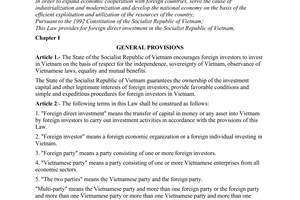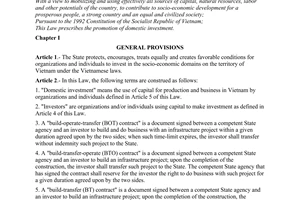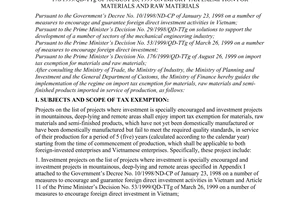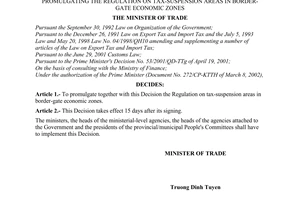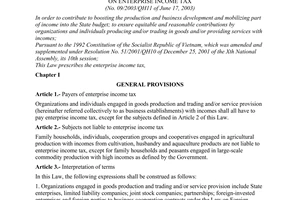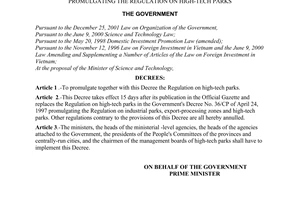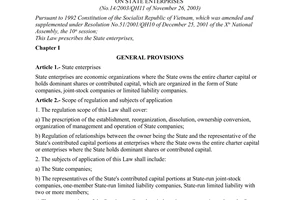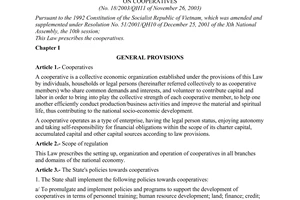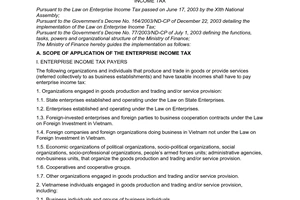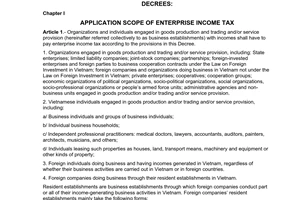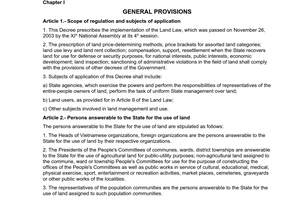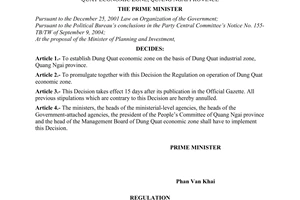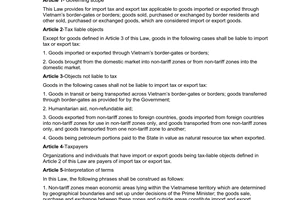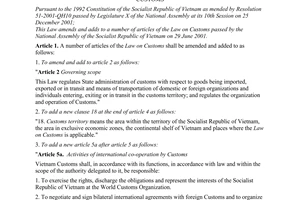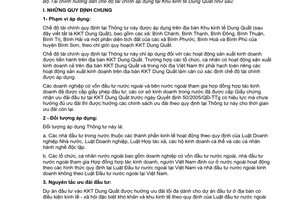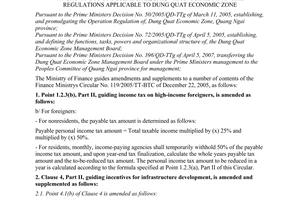Nội dung toàn văn Circular No. 119/2005/TT-BTC, guiding the financial regime applicable
|
THE
MINISTRY OF FINANCE |
SOCIALIST
REPUBLIC OF VIET NAM |
|
No. 119/2005/TT-BTC |
Hanoi, December 22, 2005 |
CIRCULAR
GUIDING THE FINANCIAL REGIME APPLICABLE TO DUNG QUAT ECONOMIC ZONE
Pursuant to the State Budget
Law;
Pursuant to the laws and ordinances on taxes, charges and fees;
Pursuant to the Prime Minister's Decision No. 50/2005/QD-TTg of March 11, 2005,
establishing, and promulgating the operation Regulation of, Dung Quat Economic
Zone, Quang Ngai province;
Pursuant to the Prime Minister's Decision No. 72/2005/QD-TTg of April 5, 2005,
establishing, and defining the functions, tasks, powers and organizational
structure of, the Dung Quat Economic Zone Management Board;
The Finance Ministry hereby guides the financial regime applicable to Dung Quat
Economic Zone as follows:
I. GENERAL PROVISIONS
1. Scope of application:
The financial regime provided for in this Circular applies to Dung Quat Economic Zone (hereinafter called Dung Quat EZ for short), embracing the communes of Binh Chanh, Binh Thanh, Binh Dong, Binh Thuan, Binh Tri, and Binh Hai, and part of the land areas of Binh Phuoc, Binh Hoa and Binh Phu communes, of Binh Son district, according to the planned boundaries of Dung Quat EZ.
The financial regime provided for in this Circular applies only to production and business activities which are conducted in Dung Quat EZ. Where organizations or individuals conduct production and business activities in both Dung Quat EZ and Vietnam's inland, they must separately account production and business activities in Dung Quat EZ to have a basis for determination of the applicable financial regime.
Foreign-invested enterprises and foreign parties to business cooperation contracts having been granted investment licenses and domestic business establishments having been granted investment preference certificates, which invest in Dung Quat EZ, before the effective date of Decision No. 50/2005/QD-TTg but have not yet fully enjoyed the preferences, shall be entitled to the preferential policies specified in this Circular for the remaining duration.
2. Subjects of application:
Subject to the application of this Circular are:
a/ Domestic investors of all economic sectors operating under the State Enterprise Law, the Enterprise Law or the Cooperative Law, individual business households and independent profession-practicing individuals.
b/ Foreign organizations and individuals, including foreign-invested enterprises, foreign investors to business cooperation contracts, overseas Vietnamese operating in the forms specified in the Law on Foreign Investment in Vietnam, and foreign investors doing business not under the Law on Foreign Investment in Vietnam.
3. Investment preference principles:
Investment projects in Dung Quat EZ shall enjoy maximum preferences for investment projects in geographical areas hit by exceptional socio-economic difficulties and economic zones according to the provisions of the Law on Foreign Investment in Vietnam, the Law on Domestic Investment Promotion, the Enterprise Income Tax Law, and other relevant provisions of law.
4. Interpretation of terms:
In this Circular, the terms below are construed as follows:
- A tax-suspension area means a geographical area separated from other functional areas of Dung Quat EZ by solid fences as provided for in Articles 8, 9 and 10 of Decision No. 50/2005/QD-TTg.
- Functional areas shall include the industrial park, port and port logistic-service area, population quarter, urban center, tourist-service area and administrative area in Dung Quat EZ.
- Vietnam’s inland shall embrace functional areas in Dung Quat EZ and the remaining part of the Vietnamese territory (except export-processing zones).
- Customs control gate: Dung Quat EZ shall have the following customs control gates in tax-suspension areas:
+ In the tax-suspension area connected with Chu Lai airport: The customs control gate contiguous with the airport (called gate A for short); the tax-suspension area’ customs control gate contiguous with the inland (called gate B for short).
+ In the tax-suspension area connected with Dung Quat port: The customs control gate at Dung Quat port (called gate A for short); the tax-suspension area’s customs control gate contiguous with the inland (called gate B for short).
- List of goods originating from tax-suspension areas means the list of goods made by the Dung Quat EZ Management Board in each period, including goods which are produced, processed, reprocessed or assembled in tax-suspension areas without the use of materials or components imported from abroad.
5. Conditions for application of the financial regime to tax-suspension areas:
The financial regime prescribed for tax-suspension areas in Dung Quat EZ shall apply only when tax-suspension areas simultaneously meet the following conditions:
- There are solid fences separating activities in tax-suspension areas from other functional areas in Dung Quat EZ;
- There are neither population quarters nor permanent or temporary residents (including foreigners) in the tax-suspension areas;
- There are customs offices supervising and inspecting people, goods and means going into and out of the tax-suspension areas.
6. Several general provisions on customs procedures applicable to tax-suspension areas:
a/ Organizations and individuals operating in tax-suspension areas may export abroad and import from abroad all goods and services not banned by Vietnamese law. Policies on exports and imports shall comply with the Prime Minister's regulations on goods import and export management in each period and the guiding documents issued by concerned ministries or branches. The import or export of goods on the list of those subject to conditional import or export or restricted business shall comply with the Trade Ministry’s guidance. Organizations and individuals operating in tax-suspension areas must strictly observe the Regulation on tax-suspension areas in border-gate economic zones, promulgated together with the Trade Ministry’s Decision No. 446/2003/QD-BTM of April 17, 2003.
b/ Biannually, enterprises operating in the tax-suspension areas shall have to send to customs offices reports on settlement of supplies, raw materials, imports and exports in the period and reports on products delivered from warehouses, warehoused in stock. Customs offices shall cross-examine and send them to tax offices for inspection and determination of payable tax amounts.
c/ Imported, exported or in-transit goods and luggage; means of transport on exit, entry or in transit in tax-suspension areas which are of a particular mode, shall be subject to the customs procedures prescribed for such mode.
d/ Imported, exported or in-transit goods; means of transport on entry, exit or in transit via tax-suspension areas may go through only gate A and gate B.
e/ For goods exported from the inland into tax-suspension areas and vice versa: For goods brought from abroad via gate B into tax-suspension areas, the customs procedures shall be carried out at gate B; for goods brought from abroad into tax-suspension areas and goods brought overseas from tax-suspension areas via gate A, the customs procedures shall be carried out at gate A.
f/ For goods exported abroad from the inland via gate A or goods brought from abroad via gate A into the inland, the customs procedures shall be carried out according to current regulations at gate A or at Customs Sub-Departments outside border gate. If the customs procedures are carried out at Customs Sub-Departments outside border gate, the regulations on goods transferred from border gate to border gate shall apply.
g/ Apart from the above-said provisions on customs procedures, the involved parties must fulfill other obligations provided for in the Customs Law, the Import Tax and Export Tax Law and other documents relating to import and export activities.
II. SPECIFIC PROVISIONS
1. Tax policies applicable to Dung Quat EZ
1.1. Enterprise income tax
a/ Domestic or foreign organizations' or individuals' investment projects for formulation of new production and business establishments in Dung Quat EZ shall enjoy the enterprise income tax rate of 10% for 15 years after such investment projects commence their business activities, the enterprise income tax exemption for 4 years after taxable incomes are generated, and a 50% reduction of payable tax amounts for 9 subsequent years.
b/ Domestic or foreign organizations' or individuals' hi-tech investment projects in Dung Quat EZ which meet the conditions set in Clause 2, Article 5 of the Government's Decree No. 99/2003/ND-CP of August 28, 2003, promulgating the Regulation on Hi-Tech Parks, shall enjoy the enterprise income tax rate of 10% throughout the project execution duration.
c/ Domestic or foreign organizations' or individuals' investment projects in Dung Quat EZ which are of large scale and important significance for branch/domain development or socio-economic development of the region shall enjoy the enterprise income tax rate of 10% throughout the project execution duration after they are approved by the Prime Minister.
d/ For investment projects on construction of new production lines, expansion of production scales, renewal of technologies, improvement of ecological environment, or raising of production capacity, the current regulations shall apply.
e/ Taxable incomes for incomes from land use right transfer or land lease right transfer are subject to income tax under the guidance in Part C of the Finance Ministry's Circular No. 128/2003/TT-BTC of December 22, 2003, guiding the implementation of the Government’s Decree No. 164/2003/ND-CP of December 22, 2003, which details the implementation of the Enterprise Income Tax Law.
f/ In order to enjoy enterprise income tax preferences, organizations and individuals that have investment projects in Dung Quat EZ must submit their business registration certificates (for domestic enterprises) or investment licenses (for foreign-invested enterprises) to tax offices of the localities where the enterprises make tax declaration and payment. Enterprise income tax preferences shall apply only to production and business establishments which have fully observed the registered regimes of accounting, invoices and vouchers and have paid taxes as declared.
g/ Enterprises shall have to notify the tax offices of the localities where they make tax declaration and payment of the duration of enterprise income tax exemption or reduction stated in this Section.
1.2. Income tax on high-income earners
1.2.1. Laborers (including Vietnamese and foreigners) working in Dung Quat EZ shall enjoy 50% reduction of payable amounts of income tax on high-income earners (hereinafter called personal income tax for short).
1.2.2. The declaration, payment and settlement of personal income tax shall comply with current guiding legal documents on personal income tax. When making personal income tax declaration and temporary payment, income-paying agencies shall deduct 50% of monthly tax amounts to be paid by laborers working in Dung Quat EZ.
1.2.3. Particularly for Vietnamese laborers and foreigners who have worked in Dung Quat EZ for less than one year (12 months), the personal income tax amount to be reduced for the duration they have worked in Dung Quat EZ is determined as follows:
a/ For Vietnamese laborers:
Monthly, income-paying agencies shall temporarily deduct 50% of the payable personal income tax amount, and upon year-end tax settlement, calculate the payable tax amount of the whole year and the tax amount to be reduced in the year according to the following formula:
|
Personal Income tax amount to be reduced in the year |
= |
Payable personal income tax Amount in the year |
x |
Taxable generated in the duration the laborers have worked in Dung Quat EZ |
x |
50% |
|
Total taxable income generated in the tax calculation year |
Of which, the payable personal income tax amount in the year is determined on the basis of the total taxable income generated in the duration the laborers have worked in Dung Quat EZ and the taxable income generated in the duration they had worked outside Dung Quat EZ.
b/ For foreigners:
- For non-residents, the payable tax amount is determined as follows:
Payable personal income tax amount = Total taxable income multiplied by (x) 25%, multiplied by (x) 50%.
- For residents, monthly, income-paying agencies shall temporarily deduct 50% of the payable personal income tax amount, and upon year-end tax settlement, calculate the payable tax amount of the whole year and the tax amount to be reduced. The personal income tax amount to be reduced in the year shall be calculated according to the formula stated at Point b.1, Section 1.2 of this Circular.
c/ The personal income tax reduction mentioned in this Circular shall not apply to irregular incomes.
1.3. Import tax and export tax
a/ Imports and exports shall not be subject to import tax or export tax in the following cases:
Goods imported from abroad into tax-suspension areas; goods exported from tax-suspension areas to foreign countries.
Goods brought from tax-suspension areas or sold to non-tariff areas (being non-tariff areas defined in Clause 1, Article 5 of the 2005 (amended) Import Tax and Export Tax Law), export-processing enterprises or bonded warehouses and vice versa.
b/ Export tax-liable goods originating from Vietnam's inland which are brought into tax-suspension areas are subject to export tax and export procedures according to current regulations.
c/ Goods imported from tax-suspension areas into Vietnam's inland are subject to import tax according to the following regulations:
For goods of foreign origin, import tax shall be paid according to current regulations.
For goods produced, processed, recycled or assembled in tax-suspension areas, if the value of goods of ASEAN origin represents 40% or more of the value of goods with certificates of ASEAN origin, form D, the CEPT import tax rates shall apply.
Goods on the list of goods originating from tax-suspension areas, which are brought into the inland, are not subject to import tax.
For goods produced, processed, recycled or assembled in Dung Quat EZ with the use of raw materials or components directly imported from abroad (excluding goods imported from Vietnam’s inland with the use of raw materials or components imported from abroad), when being imported into Vietnam’s inland, the import tax shall be paid only on the quantities of raw materials or components imported from abroad constituting such goods. Bases for determination of payable import tax on the quantities of raw materials or components imported from abroad constituting goods imported into Vietnam’s inland include the tax calculation price; quantity of goods imported into Vietnam’s inland, and import tax rate for each type of raw material or component, of which the tax calculation price and tax rate shall comply with regulations applicable at the time of making the declarations on import of goods into the inland. Business enterprises and individuals shall have to register with customs offices the lists of imports used as raw materials for production of goods imported into the inland and the norms of raw materials or components used for the production of imports before they are imported into the inland.
The value of imported raw materials or components constituting each unit of goods imported into the inland shall be calculated according to the regulations on import tax calculation price of imports at the time they are imported into the inland.
d/ Domestic or foreign organizations or individuals’ investment and production projects in Dung Quat EZ shall be exempt from import tax on production raw materials, supplies, components and semi-finished products, which cannot be produced at home yet or can be produced but are not up to quality standards, for 5 years after the commencement of production.
Procedures and dossiers of import tax exemption, declaration and settlement in this case shall comply with the Finance Ministry's Circular No. 40/2000/TT-BTC of May 15, 2000, guiding the implementation of the Prime Minister's Decision No. 176/1999/QD-TTg of August 26, 1999, on import tax exemption for raw materials. Particularly, plans on import and norms on consumption of supplies, raw materials and semi-finished products for the manufacture of products in the year shall be drawn up by enterprises, enclosed with certification of the Dung Quat EZ Management Board.
f/ Domestic and foreign organizations and individuals conducting production and business activities in tax-suspension areas, that import production raw materials, supplies and/or goods from abroad but have not used them up, and are permitted to sell the remainder of commercial value into Vietnam's inland after the completion of customs procedures, must pay import tax according to current regulations.
1.4. Special consumption tax
a/ Special consumption tax-liable goods and services which are produced or sold in tax-suspension areas or imported from abroad into tax-suspension areas and vice versa are not subject to special consumption tax (particularly for cars of under 24 seats brought into tax-suspension areas, tax shall be paid according to current regulations).
b/ Special consumption tax-liable goods and services exported from Vietnam’s inland into tax-suspension areas are not subject to special consumption tax (particularly for cars of under 24 seats brought into tax-suspension areas, tax shall be paid according to current regulations).
c/ Special consumption tax-liable goods and services brought from tax-suspension areas or sold to export-processing zones and vice versa are not subject to special consumption tax.
d/ Special consumption tax-liable goods imported from tax-suspension areas into Vietnam’s inland are subject special consumption tax on imports according to current regulations.
1.5. Value added tax
Dung Quat EZ's enterprises may use added value invoices according to current regulations, register, declare and pay value added tax for cases where value added tax is paid according to the provisions of this Circular. Where goods are not subject to value added tax, in the added value invoice, the "value added tax" section shall be marked with a cross (x). Specifically as follows:
a/ Goods and services produced and sold in tax-suspension areas and imported from abroad into tax-suspension areas and vice versa are not subject to value added tax.
b/ Goods and services brought from tax-suspension areas or sold to export-processing zones and vice versa are not subject to value added tax.
c/ Goods and services exported from Vietnam's inland into tax-suspension areas shall enjoy the value added tax rate of 0%.
d/ Goods and services imported from tax-suspension areas into Vietnam's inland are subject to value added tax on imports at the currently set tax rates.
1.6. Prices, charges, fees and other taxes
a/ Land rents, leasing prices of land already built with technical infrastructures, and charges for use of technical infrastructures, service and public-utility works in Dung Quat EZ shall be determined by infrastructure business enterprises after reaching agreement with the Dung Quat EZ Management Board.
b/ Charges, fees and other taxes shall comply with current provisions of tax laws, the (amended) Law on Domestic Investment Promotion, the Law on Foreign Investment in Vietnam, the Ordinance on Charges and Fees, and the documents guiding the implementation thereof.
2. Customs procedures for goods brought out of and into tax-suspension areas
2.1. For goods imported from abroad into tax-suspension areas:
a/ Import of goods into tax-suspension areas via gate A:
- Tax-suspension areas' enterprises shall have to make customs declaration and submit customs dossiers strictly according to current regulations applicable to each mode of importation of goods, based on the provisions of Point 5, Section I of this Circular.
- Gate-A customs offices shall carry out necessary procedures according to current regulations applicable to each type of goods.
b/ The import of goods into tax-suspension areas via gate B shall comply with current regulations applicable to imports transferred from border gate to border gate.
2.2. For goods imported from abroad into Vietnam's inland via gate A and goods exported from the inland to foreign countries via gate A, the current regulations shall apply.
2.3. For goods exported from the inland into tax-suspension areas: Customs offices shall carry out procedures only when so requested by enterprises. Customs procedures shall be carried out as follows:
a/ Where inland enterprises register to carry out the customs procedures at gate-B customs offices: Inland enterprises shall have to make customs declaration and submit customs dossiers strictly according to regulations applicable to each mode of exportation. Where goods are transported internally between enterprises and their branches inside and outside tax-suspension areas, purchase/sale contracts may be replaced by ex-warehousing vouchers. Gate-B customs offices shall have to fully carry out the export procedures for inland enterprises strictly according to regulations applicable to each mode of exportation.
b/ Where inland enterprises register their export declarations at inland Customs Sub-Departments’ border gates: Customs procedures shall comply with current regulations applicable to exports transferred from border gate to border gate. Gate-B customs offices shall perform tasks of customs offices of border gates of exportation for exports transferred from border gate to border gate (except the certification of actual exportation).
2.4. For goods exported abroad from tax-suspension areas:
a/ Via gate B: The current regulations applicable to exports transferred from border gate to border gate shall apply.
b/ Via gate A: Enterprises shall register to carry out procedures at gate-A customs offices. Gate-A customs offices shall carry out customs procedures according to current regulations applicable to exports.
2.5. Goods brought from tax-suspension areas into the inland:
a/ For goods on the list of goods originating from tax-suspension areas, they shall be exempt from customs procedures but their quantities must be declared with customs offices and are subject to customs offices' supervision.
b/ For other goods, customs procedures must be fully carried out as follows:
- Tax-suspension areas' enterprises (sellers) shall have to provide inland enterprises (purchasers) with adequate vouchers, invoices and papers according to customs offices' regulations so that inland enterprises can make customs declaration and submit customs dossiers at gate-B customs offices strictly according to regulations applicable to each mode of importation.
- Gate-B customs offices shall have to carry out customs procedures for inland enterprises' imports strictly according to regulations. If detecting that foreign goods brought into tax-suspension areas for further import into the inland area of the same kind with goods on the list of those originating from tax-suspension areas which are exempt from customs procedures as announced by the Dung Quat EZ Management Board whereas enterprises do not make customs declaration, gate-B customs offices shall request enterprises to produce documents evidencing the origin of the goods lots, handle violations and carry out import procedures for the goods lots strictly according to the provisions of law, and, at the same time, notify the Dung Quat EZ Management Board thereof so that the latter can take measures to manage or exclude such goods from the list of goods originating from tax-suspension areas.
2.6. For processed goods:
Customs procedures for goods which are processed for foreign traders by tax-suspension areas’ enterprises, or processed by inland enterprises for tax-suspension areas’ enterprises and vice versa shall comply with current regulations.
2.7. For goods which are temporarily exported for re-import, temporarily imported for re-export, transferred from border gate to border gate, in transit, or transported:
Exported, imported or transiting goods, means of transport on exit, entry or in transit via tax-suspension areas can go through only customs control gates. Customs procedures for goods which are temporarily exported for re-import, temporarily imported for re-export, transferred from border gate to border gate, in transit or transported in tax-suspension areas shall comply with current regulations.
2.8. Apart from the guidance in this Circular, enterprises must fulfill other obligations provided for in the Customs Law, the Import Tax and Export Tax Law, the Government's Decree detailing the implementation of the Customs Law and other guiding documents on customs.
3. Reward regime towards persons with merits in mobilizing domestic and foreign investment capital
3.1. The Dung Quat EZ Management Board shall promulgate a Regulation on reward for persons who have merits in mobilizing investment capital (domestic capital or foreign capital for the EZ) after obtaining the Finance Ministry's approval.
3.2. Funding for reward of organizations and individuals that have merits in mobilizing official development assistance capital, foreign direct investment projects and domestic investment projects in Dung Quat EZ shall be included in the annual state budget estimates of the Dung Quat EZ Management Board and other lawful revenue sources.
4. Preferential regimes for infrastructure development
4.1. State budget investment in infrastructure construction
a/ The state budget shall support investment in construction of important socio-technical infrastructures as well as service and public-utility works in service of Dung Quat EZ under target programs with amount to be included in cost estimates approved by competent authorities.
b/ Within the first 15 years after the effective date of Decision No. 50/2005/QD-TTg the annual state budget investment capital for Dung Quat EZ’s infrastructure construction shall not be lower than Dung Quat EZ's total state budget revenues remitted into the State Treasury, including revenues from import tax, export tax, special consumption tax on imports, enterprise income tax, income tax on high-income earners (except value added tax on imports) and other lawful revenues. Import tax, export tax and special consumption tax on imports shall be calculated only on actually imported and exported goods for which goods inspection declarations are opened at Dung Quat EZ and taxes have been paid at state treasuries in Quang Ngai province.
c/ Revenues generated in the locality shall be remitted into the state budget. The decentralization of revenue sources between the central budget and local budgets shall comply with current provisions of law. The Dung Quat EZ Management Board shall coordinate with tax offices, state treasuries and customs offices in the locality in monitoring actual revenues for use as a basis for drawing up annual capital construction capital plans for Dung Quat EZ's projects.
4.2. The management and use of central budget capital invested in construction of Dung Quat EZ’s infrastructures shall comply with the provisions on capital construction investment management, the State Budget Law and current guiding documents: Annually, at the time of making state budget estimates, the Dung Quat EZ Management Board shall coordinate with the concerned agencies in determining revenues from import tax, export tax, special consumption tax on imports, enterprise income tax, income tax on high-income earners, value added tax and other lawful revenues in Dung Quat EZ for making annual capital construction investment expenditure estimates according to the list of investment projects approved by competent authorities, then send them to the Ministry of Planning and Investment and the Ministry of Finance for sum-up report to the Government for submission to the National Assembly for decision.
4.3. Regime of using land funds for generating capital for infrastructure development
Capital mobilized from land funds in form of auctioning the land use rights or bidding for projects involving the land use rights in land allotment or land lease constitutes a capital source for investment in Dung Quat EZ's infrastructure development.
The auction of land use rights or bidding for projects involving the land use rights for land allotment or land lease in order to generate investment capital for Dung Quat EZ's infrastructure development shall comply with the Government's Decree No. 181/2004/ND-CP of October 29, 2004, on implementation of the Land Law, the Prime Minister’s Decision No. 216/2005/QD-TTg of August 31, 2005, promulgating the Regulation on auction of land use rights for allotment of land with the collection of land use levies or land lease, and other current relevant provisions of law.
4.4. Mobilization of capital through issuance of government bonds or project bonds and official development assistance (ODA) capital for investment in Dung Quat EZ's infrastructure development
The Dung Quat EZ Management Board shall submit to the Prime Minister for decision plans on issuance of government bonds or project bonds for construction of large-size projects of pivotal role in the development of Dung Quat EZ.
The issuance of government bonds or project bonds by the Dung Quat EZ Management Board shall comply with the provisions of the Government's Decree No. 141/2003/ND-CP of November 20, 2003, on the Regulation on issuance of government bonds, government-guaranteed bonds or local administrations' bonds and other forms of capital mobilization according to the provisions of law.
Priority shall be given to the use of ODA and investment preferential credit capital sources for construction of Dung Quat EZ’s necessary socio-technical infrastructures and public-utility service works, and other technical assistances. Annually and every 5 years, the Dung Quat EZ Management Board shall make capital plans and lists of investment projects using ODA and investment preferential credit capital sources and send them to the Ministry of Planning and Investment and the Ministry of Finance for sum-up report to the Prime Minister for consideration and approval.
5. Financial regime applicable to the Dung Quat EZ Management Board
The Dung Quat EZ Management Board is a grade-I state budget-estimating unit and a major body in allocating central budget estimates. Capital construction investment funds and operation expenditures shall be covered by the central budget.
The making, implementation and settlement of capital construction funds and operation expenditures shall comply with current guiding documents on capital construction investment and state budget.
III. ORGANIZATION OF IMPLEMENTATION
1. This Circular takes effect 15 days after its publication in "CONG BAO."
2. The Dung Quat EZ Management Board shall coordinate with local tax offices, customs offices and state treasuries where its accounts are opened in separately monitoring the revenues specified at Item b, Point 4 of Section II for management thereof and formulation of capital construction investment capital plans.
3. The Customs Department of Quang Ngai province shall have the responsibilities:
- To organize the combat of smuggling and trade fraud, preclude illegal import of goods from tax-suspension areas into the inland and in other areas within customs offices' operation areas.
- To coordinate with the EZ Management Board and concerned agencies (tax, public security, border guard) in combating smuggling and trade fraud and precluding illegal import of goods from tax-suspension areas into the inland.
4. Tax-suspension areas' customs offices shall inspect and supervise goods and means of transport, prevent and combat cross-border smuggling and illegal transport of goods; organize the implementation of law on taxes on imports and exports; organize customs stations according to regulations and suitable to tax-suspension areas' geographical characteristics in order to well perform their assigned tasks.
5. The General Department of Customs shall base itself on this Circular's provisions on customs procedures to elaborate a detailed Regulation on customs process and procedures applicable to tax-suspension areas and report it to the Finance Ministry before promulgation.
6. State treasuries in Dung Quat EZ shall separately monitor revenue sources subject to detailed monitoring at the request of the Dung Quat EZ Management Board on the principle of observing state treasury management operations.
7. Any problems arising in the course of implementation should be reported to the Finance Ministry for study and additional guidance.
|
|
FOR
THE MINISTER OF FINANCE |
